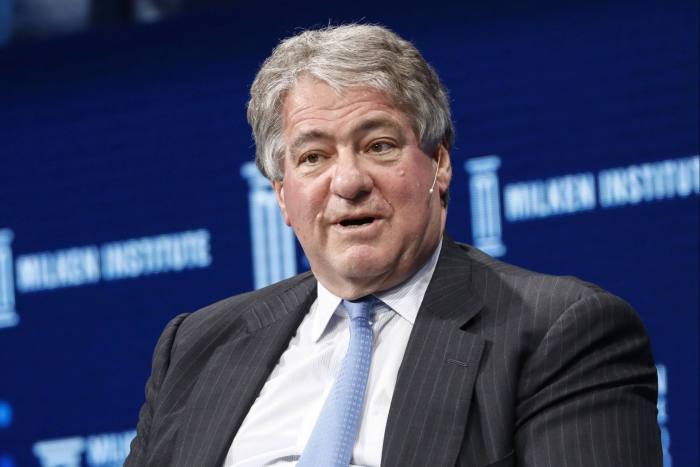
One thing to start: Lawyers for a woman who accuses Leon Black of rape have asked a court for permission to quit the case, marking a dramatic turn in a lawsuit that the private equity billionaire has maintained was concocted by business rivals in an effort to oust him as chief executive of Apollo Global Management.

Welcome to Due Diligence, your briefing on dealmaking, private equity and corporate finance. This article is an on-site version of the newsletter. Sign up here to get the newsletter sent to your inbox every Tuesday to Friday. Get in touch with us anytime: [email protected]
In today’s newsletter:
M&A bankers suffer the worst start to a year since 2013
The pain across investment banking has not let up.
Global dealmaking this year got off to its slowest start in a decade, with the value of mergers and acquisitions agreed between January and March plunging 45 per cent from a year prior to $550.5bn, a DD analysis of Refinitiv data found.
It marked the largest first-quarter decline since 2001 and came on the heels of a dreadful 2022, which registered the biggest drop in dealmaking in decades as an era of cheap money came firmly to an end. The lack of activity prompted banks across Wall Street to take the knife to their workforces, with bonuses falling the most since the financial crisis.
In something of a preview of the difficulties faced by banks going into earnings season, Jefferies earlier this week reported fees it earned advising companies on M&A had dropped 45 per cent in its first quarter, which ran through the end of February.
The fallout of Silicon Valley Bank’s collapse and UBS’s rescue of Swiss rival Credit Suisse have only added to turmoil in financial markets, and will probably complicate matters for corporate executives and private equity groups trying to push ahead with takeovers.
“The environment for M&A transactions continues to be very challenging,” Frank Aquila, Sullivan & Cromwell senior M&A partner, told DD’s Ivan Levingston, James Fontanella-Khan and Ortenca Aliaj. “Increasing concerns about the broader economy and the prospect for a recession later this year in the United States has certainly made decision makers hesitant to move forward.”
Advisers who had some confidence earlier in the year that a rebound would take hold in markets and bolster dealmaking now warn that the crisis has made that less likely.
“The other question on everyone’s mind is if this banking crisis has been avoided or just deferred,” said Naveen Nataraj, co-head of Evercore’s US advisory business.
That is testing the appetite of Wall Street behemoths to finance big leveraged buyouts, just weeks after several showed their willingness to underwrite private equity-backed takeovers conceived by Silver Lake and Apollo. Top bankers and lawyers said those deals — announced just days after SVB failed — had been under way for weeks and bankers would have faced stiff pushback (not to mention a smudge on their reputations) if they attempted to back out.
Private credit groups instead are waiting in the wings. Among the takeovers where the alternative asset managers are expected to play a big role is Carlyle’s purchase of a 50 per cent stake in healthcare analytics company Cotiviti, a deal that has yet to be clinched.
There were only a few bright spots in the quarter: notably, healthcare takeovers, which accounted for nearly a fifth of deals. The activity was bolstered by the year’s biggest deal so far, Pfizer’s $43bn acquisition of oncology-focused biotech Seagen.
The other winner proved to be the boutique advisory shops, which grew market share. While JPMorgan Chase and Goldman Sachs led the rankings for M&A advisers, Centerview Partners took the third spot in the best showing for a boutique operation in decades.
The strategy behind Alibaba’s radical overhaul
Two days after Alibaba announced the largest restructuring in its history, the Chinese retail and tech behemoth’s chief executive Daniel Zhang dropped another big bomb.
The radical plan to split the company into six business units will not only allow each newly formed entity to pursue outside capital and its own public listing, but will also enable Alibaba to decide which units to retain control of after they go public.
It’s the first indication that the sprawling ecommerce conglomerate could siphon off parts of the company entirely, a move that would transform Alibaba into “an asset and capital operator, [rather] than a business operator”, Zhang said on Thursday.
The shake-up is an ambitious attempt to restore some glory to China’s best-known ecommerce company, after its share price had been battered by Beijing’s crackdown on internet giants and the emergence of nimble-footed rivals like Pinduoduo and ByteDance.
It’s also an attempt to stay on the good side of the government now that Beijing has signalled an end to the regulatory maelstrom, while also referring back to the old playbook of boosting shareholder value.
The restructuring should allow investors to assess the worth of individual business units and encourage Alibaba to cut spending on unprofitable and cash-burning operations, including its media group and food delivery businesses.
The news comes as Jack Ma, who founded Alibaba 24 years ago, made a surprise return to mainland China after spending much of the past year in Tokyo and Hong Kong. On Monday, the once outspoken Ma emerged from the shadows to talk about the educational reform at a private school established by Alibaba co-founders.
Company insiders told the Financial Times that the trip was timed to show support for Zhang’s restructuring programme. It remains to be seen whether investors will see the trip as an indication that Beijing is serious about its pledge to support entrepreneurs as it seeks to bolster growth after the end of its zero-Covid policy.
Regulators take aim at commercial real estate and leveraged loans
Big banks were thought to be the beneficiaries of rising interest rates. Instead, two banks have blown up. Regulators now attempting to gauge the fallout of higher interest rates on the banking system are training their sights on two areas: commercial real estate and risky corporate loans.
The commercial property market, already under strain from high vacancy rates as companies cut back on office space, is struggling with higher borrowing costs and declining valuations (it’s why investors are so focused on how the Federal Deposit Insurance Company’s eventual sale of Signature Bank’s property portfolio goes and how much the buildings fetch).
JPMorgan Chase analysts estimate that small- and medium-sized banks — those struggling with deposit outflows — account for about 70 per cent of so-called CRE loans. Most of those loans aren’t securitised and end up remaining on small bank balance sheets.
Federal Reserve chair Jay Powell said last week that the US central bank “was aware” of concentration in CRE lending, while his counterparts at the European Central Bank have warned banks’ exposure to commercial real estate is a “key vulnerability”.
Meanwhile, for astute DD readers, the risks of higher interest rates on the leveraged loan market were laid bare months before SVB collapsed.
Higher rates made the leveraged loans banks were underwriting in 2021 and early 2022 worth significantly less, and banks took it on the chin selling debt tied to the buyouts of Citrix and Nielsen (they are meant to be nursing mark-to-market losses on Twitter).
Regulated banks, which had started to dip their toe back into the business just as SVB was failing — including large commitments to fund the buyouts of Univar and Qualtrics earlier this month — are again retreating, bankers and investors tell DD.
It’s not lost on regulators that these risky deals have increasingly migrated out of the banking system and are fuelling the growth of private credit, warning last month that they would “continue to focus on assessing the impact of layered risks in leveraged lending transactions”.
Job moves
-
United Arab Emirates president Sheikh Mohammed bin Zayed al-Nahyan has named his eldest son Sheikh Khaled crown prince of Abu Dhabi and promoted three of his brothers including Sheikh Tahnoon, the UAE’s national security adviser and also oversees a sprawling business empire.
-
Citigroup has hired Bank of America’s Andy Sieg as its new head of global wealth management, according to a memo seen by DD.
-
BofA has promoted Lindsay Hans and Eric Schimpf to replace Sieg as co-heads of Merrill Wealth Management.
-
Linklaters has elected 41 new partners and 53 counsel.
Smart reads
Red flags at Revolut The UK fintech has frustrated its board and raised eyebrows in the accounting industry after portraying a critical audit report as a clean bill of health, the FT reports.
Interest rates stir up drama The final season of HBO’s Succession could also mark the end of the easy money era in Hollywood, the FT’s Anna Nicolaou writes.
Damned if you do . . . First Republic’s wealthy customers are torn over whether to remain loyal to the crisis-struck bank, Bloomberg reports.
News round-up
Boomerang chief executives provide comfort in times of crisis (FT)
Donald Trump indicted on criminal charges in Manhattan (FT)
Wirecard suit against Indian group can proceed, High Court rules (FT)
Raiffeisen in talks over sale of Russian banking arm (FT)
Singapore’s GIC to buy Japan’s top HR software developer for $2.6bn (Nikkei Asia)
Illumina chief’s pay nearly doubles ahead of clash with Carl Icahn (FT)
Bankers found guilty of helping to hide Putin’s millions by Swiss court (FT)
British music brand Marshall sells to Zound Industries (FT)
Due Diligence is written by Arash Massoudi, Ivan Levingston, William Louch and Robert Smith in London, James Fontanella-Khan, Francesca Friday, Ortenca Aliaj, Sujeet Indap, Eric Platt, Mark Vandevelde and Antoine Gara in New York, Kaye Wiggins in Hong Kong, George Hammond and Tabby Kinder in San Francisco, and Javier Espinoza in Brussels. Please send feedback to [email protected]
Recommended newsletters for you
Unhedged — Robert Armstrong dissects the most important market trends and discusses how Wall Street’s best minds respond to them. Sign up here
Full Disclosure — Keeping you up to date with the biggest international legal news, from the courts to law enforcement and the business of law. Sign up here